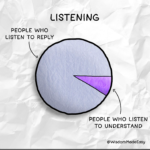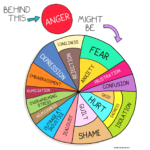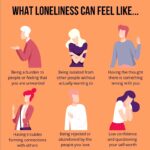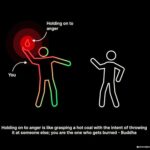After 30 years as a psychiatrist, one of the most valuable lessons I’ve learned is the art of listening.
True listening goes beyond hearing the words; it involves understanding the story behind the words, the emotions wrapped within them, and the unspoken thoughts that linger between the lines.
A person’s words offer a window into their emotions and lives – if we take the time to listen.
Let’s be honest—listening is often easier said than done. In conversations, it’s tempting to jump ahead, to assume we know what others are about to say and to prepare our next argument while they’re still speaking.
But here’s what I’ve realized (at times, painfully): when we presume to know what someone else is thinking, we’re not truly listening. We’re just waiting for our turn to speak.
Over the years, I’ve dedicated myself to becoming a better listener—a skill that doesn’t come automatically to most of us. It certainly didn’t to me.
We are naturally more concerned with our own thoughts and feelings. This isn’t a flaw; it’s human nature. But, I’ve seen firsthand how learning to practice active listening has not only made me a better psychiatrist but, hopefully, a more empathetic human being.
Here are three key practices I’ve found invaluable in honing my listening skills:
✅ Pause Before Responding:
Take a moment to truly absorb what the other person has said. This helps in understanding their perspective deeply, rather than just reacting to it.
✅ Ask Clarifying Questions:
Sometimes what a person says isn’t the whole picture. Asking questions encourages them to express more, and you gain better insight.
✅ Reflect Back What You Hear:
This doesn’t just show that you are listening; it helps confirm that you understand their message accurately.
I continually try to improve my listening abilities because I believe it’s a lifelong journey. I certainly have not mastered this. I am always learning and trying to do better.
Listening isn’t just a professional skill – it is essential for meaningful connections. Every day offers a chance to listen better and deepen our understanding of one another.
Make sure you are taking the time. Just listen…
Peter Zafirides, MD
Central Ohio Behavioral Medicine
PSYCHIATRY
COLUMBUS, OHIO
If you’re experiencing anxiety or depression do not take these symptoms lightly. The earlier you get help, the quicker you can find healing, because your symptoms truly can get better. Working with our psychiatrists is a proven path for dealing with such concerns. Contact us to talk about getting you the help you need and deserve.






